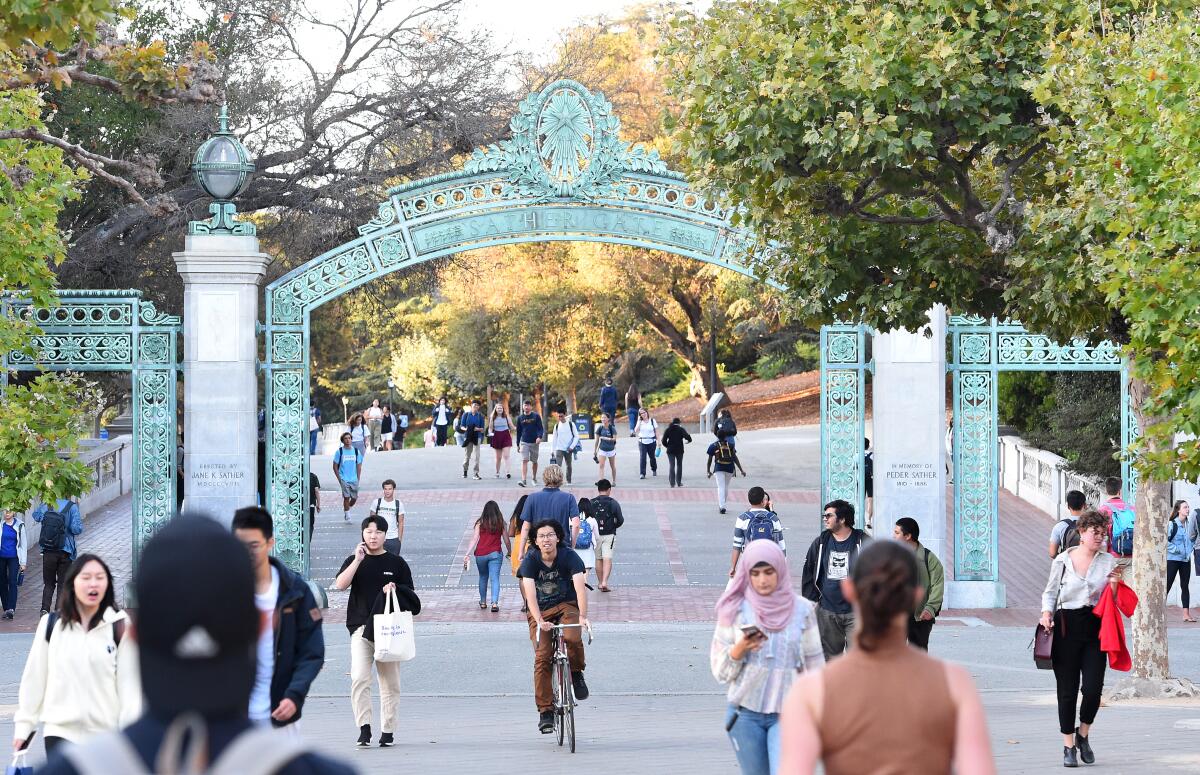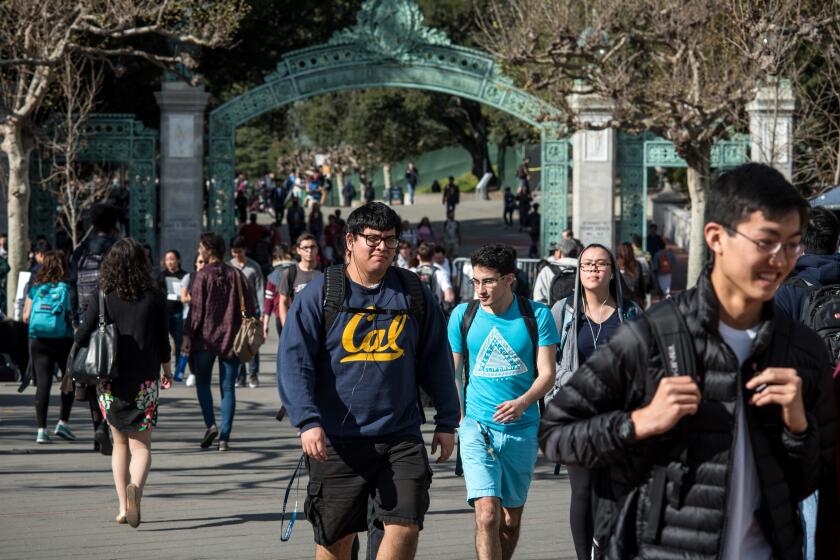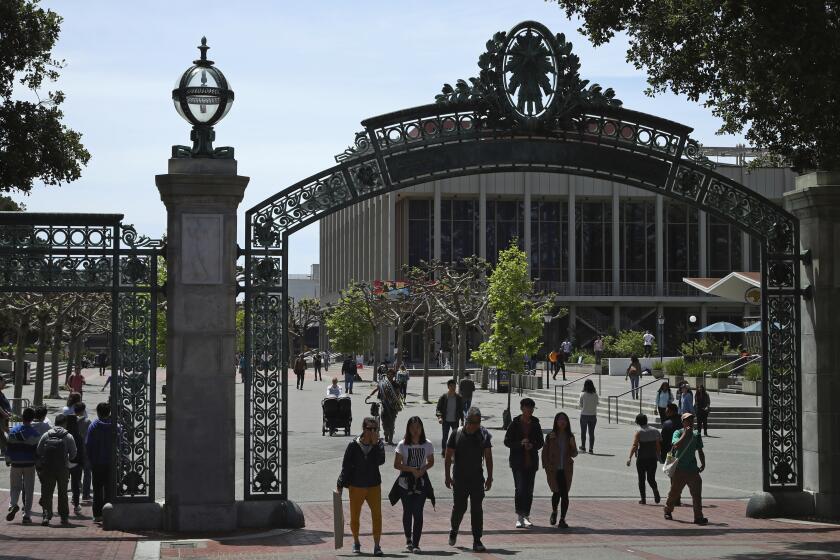Here’s why UC Berkeley may be forced to slash 3,000 seats from its fall class

- Share via
This week, UC Berkeley announced that if a court order stands, it would be forced to slash its incoming fall 2022 class by one-third, or 3,050 seats for first-year and transfer students. The news — just a month before the campus was set to release admission decisions — set 150,000 applicants and their families on edge.
The University of California is appealing to the California Supreme Court, asking justices to stay the lower court ruling that froze enrollment, which would allow Berkeley to avert any cuts in its planned admission targets for fall.
Here are the issues:
What’s at stake?
The potential impact is huge. Alameda County Superior Court Judge Brad Seligman ordered Berkeley to cap its enrollment at its 2020-21 level of 42,357 students. To get to that level, Berkeley would have to cut admission offers by at least 5,100 to account for the share of applicants who decline acceptance. UC, in its appeal to the high court, said the enrollment cap would prove particularly “catastrophic” to the top-rated public research university’s goal to admit more low-income, underrepresented students. That’s because cutting the incoming class by one-third would force the campus to reassess its selections and delay the release of admission decisions, giving low-income students less time for financial advising before the May 1 commitment deadline.
In addition, Berkeley said the enrollment cap would result in a $57-million loss in tuition revenue, which would shrink available financial aid, squeeze campus operations and possibly limit class offerings.
UC Berkeley may be forced to slash its incoming undergraduate class by one-third, or 3,050 seats, and forgo $57 million in lost tuition.
UC Berkeley Law School Dean Erwin Chemerinsky sees a more sweeping impact. If the lower court ruling is allowed to stand, he said, judges would be granted enormous power to micromanage enrollment at every public school in California.
Phil Bokovoy, president of Save Berkeley’s Neighborhoods, the community group that filed the lawsuit, rejects such assertions as scaremongering. He said that state law has long required universities to assess the environmental impact of enrollment and that his group is merely trying to hold Berkeley accountable to that obligation. He blamed the university for failing to adequately review the impact of its burgeoning student population and not building enough housing to accommodate it. Berkeley could manage the cutback without hurting California students by denying admission to international and other out-of-state applicants, he said.
How did this all start?
In 2005, UC Berkeley issued a long-range development plan and environmental review based on a projected enrollment of 33,450 by 2020. In 2016, Bokovoy’s group learned that enrollment had already grown more than 30% above that level. In April 2018, the nonprofit sued the university, asserting that the California Environmental Quality Act required a review of the impact of that unanticipated enrollment increase. Berkeley conducted the review but concluded there was no significant impact.
In 2019, the nonprofit and the city of Berkeley sued on the grounds that the university’s analysis was inadequate and its conclusion wrong. Bokovoy asserted that the 11,000 additional students had exacerbated the city’s housing shortage, displacing low-income residents and increasing homelessness, and intensified noise and trash problems. The city’s lawsuit asserted other impacts on public services.
In August 2021, Seligman ruled that UC Berkeley had not properly evaluated the impact of enrollment growth and ordered another review. At the same time, he directed the campus to roll back its enrollment to its 2020-21 level. It was the first time any court had ever issued an injunction against UC specifically on enrollment related to long-range development plans. Berkeley said that freezing enrollment at the 2020-21 level was inappropriate because the pandemic caused enrollment to unexpectedly drop by more than 800 students that year as many students took time off.
The CEQA lawsuit stopping UC Berkeley from expanding enrollment shows it’s too easy to exploit California’s main environmental law.
The UC Board of Regents appealed the ruling in the overall case in October. UC thought its appeal would automatically stay the entire judgment, including the enrollment freeze. A new legal team appointed in November explicitly requested a stay on Jan. 28. The appellate court denied the UC request on Feb. 10. Now UC is appealing to the state high court.
What do experts think the high court will do?
Legal experts are unsure. UC argued the court must intervene because the issue is “an important question of law and an urgent matter of public policy.”
Bokovoy’s legal team disagrees, saying in court documents that “the Regents’ desire to increase enrollment” is not urgent, particularly since other UC campuses could take the extra students. Some are concerned that the high court will deny the UC request to stay the enrollment freeze in part because it was filed so late — five months after the initial trial court ruling. In its appeal to the high court, UC said the delay was “regrettable” but called it an “excusable error” because it was reasonable to believe the ruling would be automatically stayed.
Why didn’t UC Berkeley alert applicants about this problem earlier?
UC Berkeley learned about the order to freeze enrollment in August, a few weeks after it opened its application portal for fall 2022 and more than three months before its Nov. 30 submission deadline. The campus said it did not notify applicants then about any possible cutback in seats because “we did not have a strong indication that the matter would turn out this way,” calling it “an unprecedented series of events” in a statement to The Times. The campus also said admissions officials do not share speculation with student applicants and others, and want to make sure all information is accurate.
What happens if the high court declines to intervene?
“We are exploring all options and our hope is for a remedy (via the courts or the legislature) that will result in no need to reduce this fall’s enrollment by 3,050,” the UC Berkeley statement said. The campus added that it has not yet identified a “good legislative solution.”
State Sen. Scott Wiener (D-San Francisco) said he plans to unveil legislation next week related to the state environmental law that was used by the Berkeley neighborhood group. He declined to release details but said the state law was never intended to stop public universities from expanding to meet student needs.
Wiener noted, however, that any legislation, even if approved and signed by the governor, would not take effect until next year. That would be too late for this year’s crop of Berkeley applicants.
Berkeley’s mayor and two City Council members explain why California’s high court should stay the order requiring UC Berkeley to freeze enrollment.
Is a settlement between the two sides possible?
Bokovoy said his group would be willing to withdraw its lawsuit if Berkeley would tie enrollment growth to housing production in a binding agreement. The university said, however, that Bokovoy is also demanding permanent enrollment caps, which is “unacceptable because they are inconsistent with the mission of the campus and its role as a public agency.”
In August, the city of Berkeley withdrew its lawsuit against the university after the two sides forged an $82.6-million settlement that more than doubled the campus’ annual payment for student use of police, fire and other city services. The agreement commits Berkeley to confer with the city if undergraduate enrollment grows by more than 1% annually averaged over three consecutive years. The city reserved the right to terminate the agreement if enrollment grows by more than 1% annually and sue the university over projects other than three ongoing housing developments and the 2020 adoption of the new long range development plan.
More to Read
Sign up for Essential California
The most important California stories and recommendations in your inbox every morning.
You may occasionally receive promotional content from the Los Angeles Times.

















